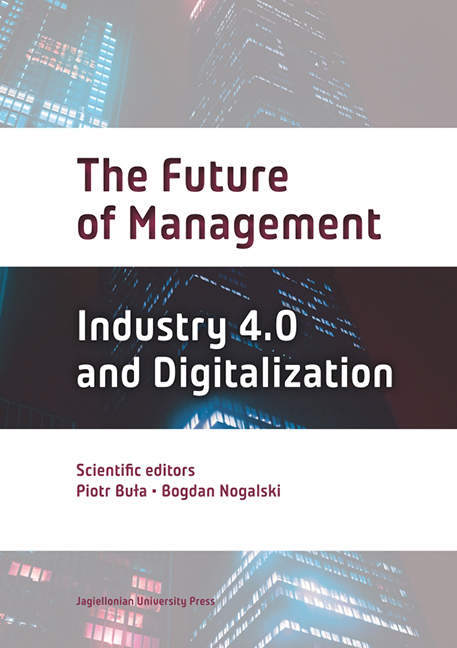Book contents
- Frontmatter
- Contents
- Preface
- Industry 4.0: Social Impacts and Operations Management Challenges
- Business Model Changes in the Presence of Challenges Brought by Industry 4.0
- Communication in Traditional and Network Organisation: Transformation
- Consequences of the Fourth Industrial Revolution in Social and Economic Development in the 21st Century
- Ideology, Trust, and Spirituality: A Framework for Management Control Research in the Era of Industry 4.0
- Renewable Energy through Industry 4.0 on the Example of Photovoltaic Development in Selected European Countries
- Employee Loyalty in the ICT Sector as a Challenge for Building Industry 4.0
- The Importance of Flexibility of Human, Tangible and Intangible Resources in Selected Production Entrepreneurships: Results of Empirical Research
- Challenges Posed for Universities by the Industry 4.0 Environment
- Big Data in Managing Marketing Communication
- Mathematical Risk Assessment Method in the Implementation of Logistic Processes
- Management and Digitisation
- Branding of Time as a New Direction in Tomorrow’s Management
- The Future of Branding
Big Data in Managing Marketing Communication
Published online by Cambridge University Press: 16 November 2021
- Frontmatter
- Contents
- Preface
- Industry 4.0: Social Impacts and Operations Management Challenges
- Business Model Changes in the Presence of Challenges Brought by Industry 4.0
- Communication in Traditional and Network Organisation: Transformation
- Consequences of the Fourth Industrial Revolution in Social and Economic Development in the 21st Century
- Ideology, Trust, and Spirituality: A Framework for Management Control Research in the Era of Industry 4.0
- Renewable Energy through Industry 4.0 on the Example of Photovoltaic Development in Selected European Countries
- Employee Loyalty in the ICT Sector as a Challenge for Building Industry 4.0
- The Importance of Flexibility of Human, Tangible and Intangible Resources in Selected Production Entrepreneurships: Results of Empirical Research
- Challenges Posed for Universities by the Industry 4.0 Environment
- Big Data in Managing Marketing Communication
- Mathematical Risk Assessment Method in the Implementation of Logistic Processes
- Management and Digitisation
- Branding of Time as a New Direction in Tomorrow’s Management
- The Future of Branding
Summary
Abstract
The huge amount of generated information is now a global phenomenon affecting all market participants, and the need to constantly collect and process significant amounts of data is becoming a daily reality for decision making. The article aims to introduce the concept of Big Data and to indicate the possibility of using large data sets by modern entities primarily in the field of communication management. Very large data sets are created not only thanks to devices enabling data transmission but also through mutual interactions of people, e.g. in social networks. The acquisition and correct interpretation of this data play an important role in market entities, especially in the field of management, including communication management, since greater availability of data means more accurate decisions, although it also raises some problems. The article was prepared based on a literature review, research reports and analysis of secondary sources. The presented considerations will be the basis for further conclusions in the direction of empirical research.
Keywords: Big Data, marketing communication, data processing and collection, communication management, data interpretation
Literature review
Modern technologies affect not only our everyday lives but above all human methods. Telephones, tablets, television, radio, smartphones and game consoles are available everywhere. The needs and expectations of today's consumers regarding communication vary and will change; they are focused on here and now. Digital transformation includes more and more entities that change their way of thinking, acting, management, including by exploiting the potential of social media, mobile technology and other digital solutions. Cyberspace is a reflection of the idea of subject fragmentation and consumer orientation. On the one hand, it is about the multiplicity of buyers’ identities, while on the other, it concerns the immediate availability of information on the Internet (which, according to D.I. Hoffman is the most important invention since the discovery of printing), allowing to immediately meet the expectations of the recipient. “The ephemeral nature of hyperreality forces enormous flexibility” of the created strategies, including communication strategies. The effectiveness of many campaigns is often a derivative of the analysed data and the used technology.
Data processing and collection is becoming more convenient and cheaper.
- Type
- Chapter
- Information
- The Future of ManagementVolume Two: Industry 4.0 and Digitalization, pp. 149 - 160Publisher: Jagiellonian University PressPrint publication year: 2022

